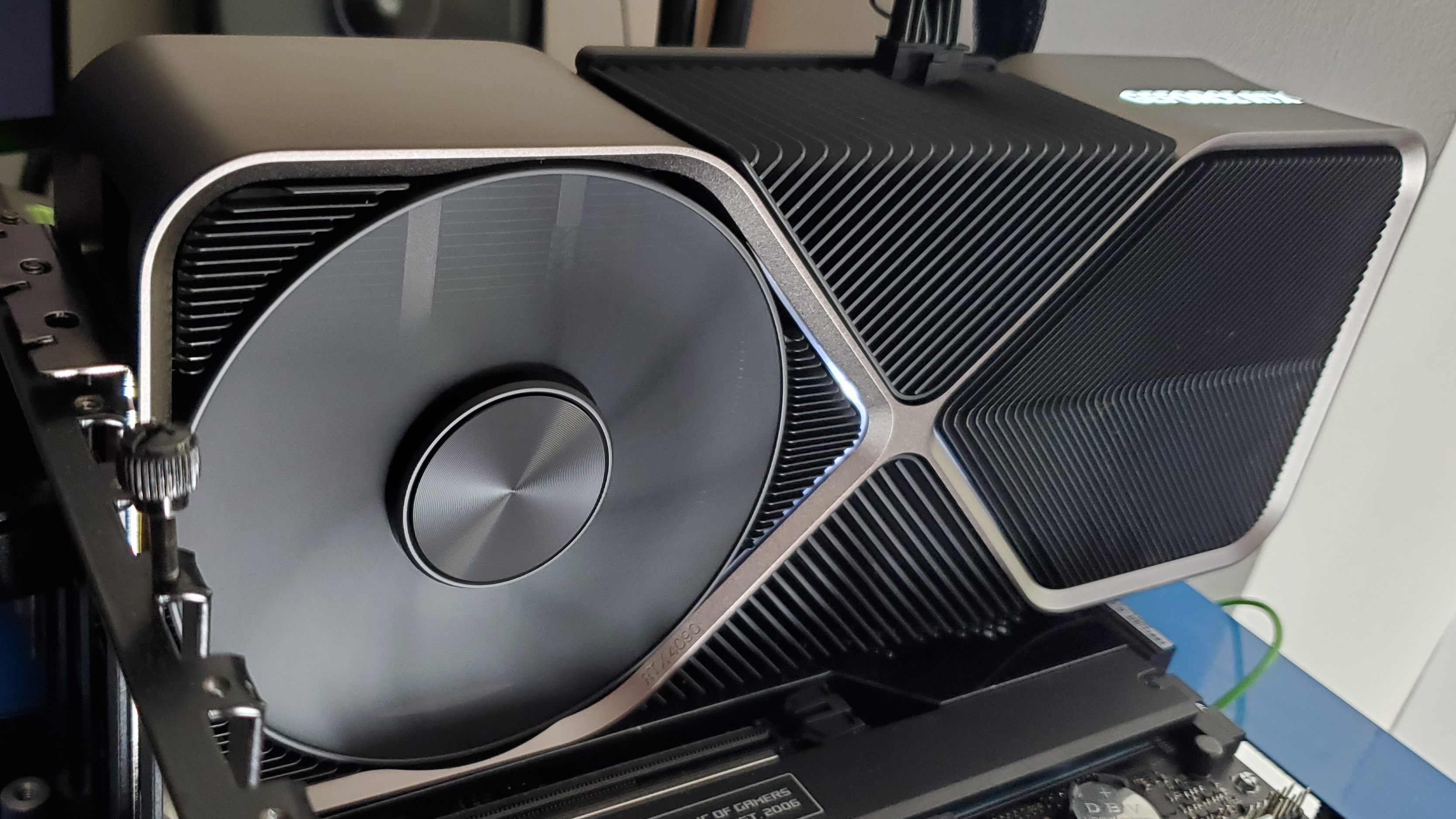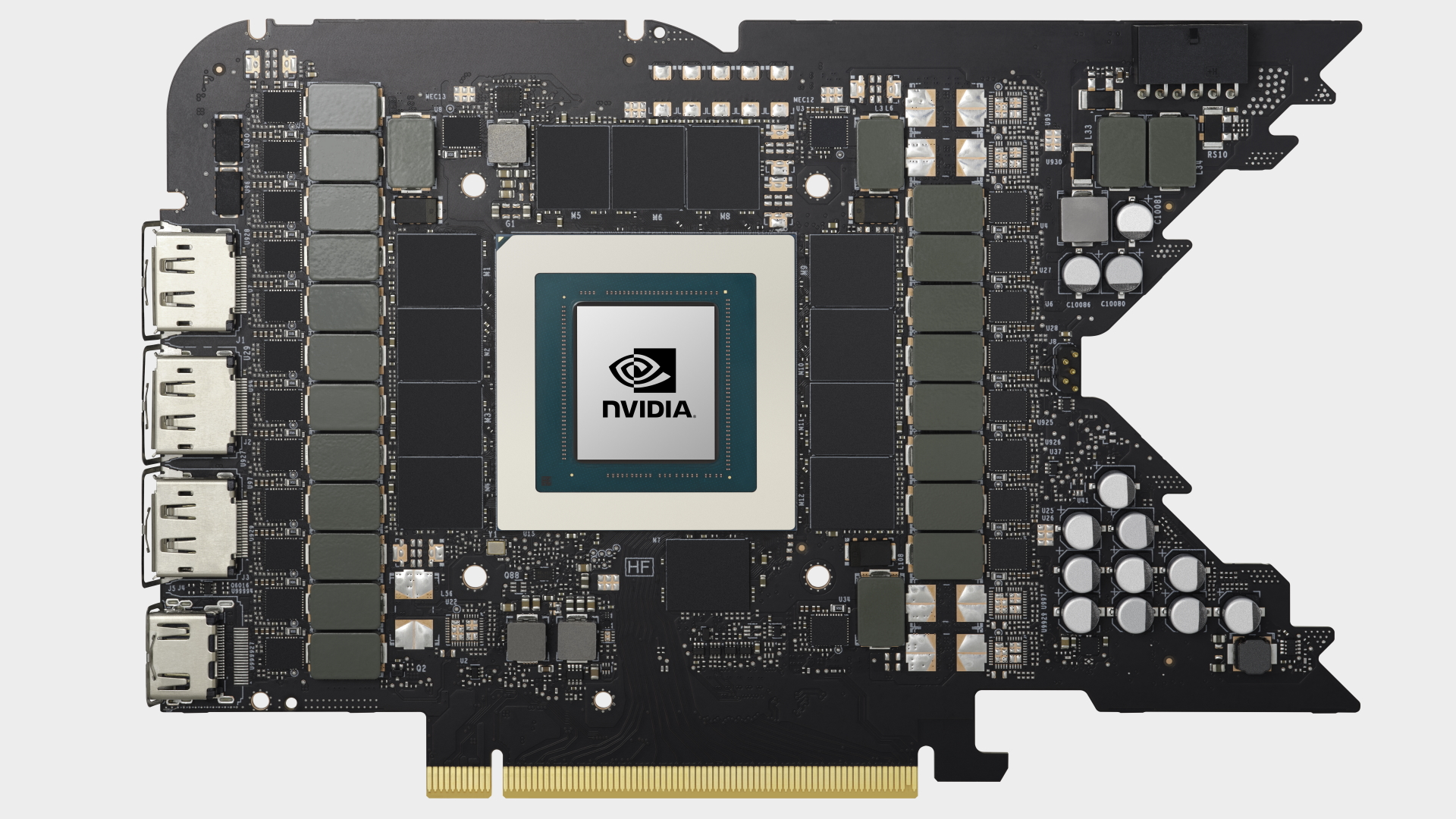I'm trembling at the potential power of a 21,760-core RTX 5090. And the price. Actually mostly the price
"I'll never financially recover from this."

Nvidia will announce the next generation of GeForce graphics card at some point. This we know. What we can't say for sure is just what that next generation will look like. We're not completely in the dark, however. Recent leaks claiming insight into Nvidia's mammoth machinations suggest we're eyeing up a graphics card of herculean proportions.
On the word of a reliable leaker over on X, kopite7kimi. They claim the card will offer 32 GB of GDDR7 memory, across a 512-bit memory bus. Once up-and-running, said card will gobble up 600 watts—right at the maximum output available from a single 12v2x6 connector and PCIe connection.
Moreover, the reported RTX 5090 will consist of 21,760 CUDA cores—that's 33% more cores than the RTX 4090.
The GB202-300-A1 would need to be absolutely massive to house that many CUDA cores, too. If you scaled up the AD102 GPU found inside the RTX 4090 to the size of Nvidia's best datacentre chip, Hopper's GH100, you'd probably fit just enough SMs inside it to make the RTX 5090. That makes for a die size around 814mm2, or conveniently just over 33% larger than the AD102 at 609mm2.
Clearly, this proposed graphics card would make mincemeat of 4K. It might even lend credence to Nvidia's claims of 8K gaming, too. Though my initial reaction is split between feelings of awe, wonder, excitement, and some degree of fear.
Is the RTX 5090 going to be the most expensive gaming graphics card yet?
The initial leak has led many onlookers to expect such a thing, including KitGuru's Leo Waldock asking whether we'd get any change from our $2,500 down payment.
The biggest gaming news, reviews and hardware deals
Keep up to date with the most important stories and the best deals, as picked by the PC Gamer team.
And will we get change from 2500 USD?September 26, 2024
Thankfully, Leo, I dare say that feels too much, even for this monster card.
Let's break it down into simple mathematics. The RTX 4090 started out at $1,599 in the US, though it was relatively more expensive in most of Europe. We'll take the US MSRP for ease, anyways. With 33% more cores, lending to a presumed 33% or more fps gain in games, the RTX 5090 is already coming close to $2,149. Perhaps $2,099 on a good day.
Would Nvidia go as simple as matching the price to the performance like that? Nvidia has often priced its graphics cards more or less directly in line with their performance uplift, even to the point of some frustration with the RTX 40-series. That said, the RTX 4090 was a much better deal than most. Expensive, yes, but a good deal for what you got.
The RTX 4090 trounced the RTX 3090 Ti. I mean, really trounced it. And when the price tag was a mere $1,599, that's actually a significant price reduction versus the RTX 3090 Ti at $1,999.
This tells us two things: firstly, that Nvidia doesn't mind pricing a graphics card at a whopping $2,000; secondly, that Nvidia isn't necessarily pricing graphics cards in tandem with performance.

So, maybe we're actually looking at a $1,899/$1,999 card in the RTX 5090. That'd be a pretty good scenario, and anything less than that would be a brilliant one. What gives me serious hesitation, however, is just how expensive the RTX 4090 is right now.
You can chalk up the RTX 4090's inflated price tag to its AI ability, ban in China, or assumed end of life status, but it's never really been a card that's sold at its MSRP. You'd have been lucky to pay just $1,599 for one—they've been upwards of $1,650, if not $2,000, at frequent times throughout its two-year lifespan.
So, the card that's potentially two thirds of what this proposed RTX 5090 can manage is already selling for $2,000, as the market demands, and Nvidia's previous history suggests it's not a company that likes being cut out of its own profit.
If the demand is there for extreme-high-end graphics cards such as the RTX 4090, and to such an extent for board partners and retailers to happily charge upwards of $2,000 for one, that's going to give any business-savvy product manager at Nvidia a bright idea: 'If they can charge $2,000 for the RTX 4090, why can't we charge $2,200 for the RTX 5090?'

Best CPU for gaming: The top chips from Intel and AMD.
Best gaming motherboard: The right boards.
Best graphics card: Your perfect pixel-pusher awaits.
Best SSD for gaming: Get into the game ahead of the rest.
We saw this sort of thinking back during the cryptocurrency mining craze, which is what seemingly led to such extremely high, but unsustainable, prices for cards such as the RTX 3090 Ti and later the unlaunched RTX 4080 12GB. I remember saying back then I sure hope these inflated prices don't act as an excuse to keep prices high once the craze is over, and they did, for a bit. But then Nvidia saw sense and realised it had to bring its prices within reason for us mere mortals.
But the point stands: the roof has been blown off graphics card prices in the past half decade, and we're slightly at the mercy of the market to tell us what to spend on these cards. The super-duper overclocked Asus Strix or equivalent RTX 5090 is sure going to sail past $2,000 whether that's the MSRP for the Founders Edition or not. For now, we don't know what Nvidia would like to price the RTX 5090 at, nor will we find out for quite some time.
The RTX 5090 is currently rumoured to be announced at CES 2025 and planned prices can, and very likely will, change between now and then.

Jacob earned his first byline writing for his own tech blog. From there, he graduated to professionally breaking things as hardware writer at PCGamesN, and would go on to run the team as hardware editor. He joined PC Gamer's top staff as senior hardware editor before becoming managing editor of the hardware team, and you'll now find him reporting on the latest developments in the technology and gaming industries and testing the newest PC components.

